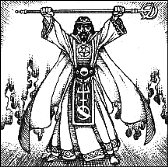There are some ways around this. For instance, it doesn't necessarily follow that the magic-user will kill his opponents once he's cast Sleep on them. It's much more interesting to take some other approach, such as capturing them and imprisoning them (giving an interesting "jailbreak" adventure) or putting them on an undesirable quest, etc. There are a lot of interesting possibilities for a villainous M-U to mess with a party, including selling them off to humanoid slavers, or teleporting them to a foreign land.
A second possibility is that, when confronted with an enemy magic-user, the standard shouldn't be for a party to rush in and fight; it's a good way of turning an encounter into a careful, loaded negotiation session where characters on both sides have their fingers on the proverbial triggers. The notion that each side can just "Sleep 'em" becomes something like the threat of a classic showdown.
And of course there's always the chance that the MU doesn't have the Sleep spell and will instead use Magic Missile or Charm Person or something else entirely. Random spell generation goes a long way in ensuring that this is spread out in a "fair" manner - and any spells known may of course be in their spellbook for PC magic-users.
But another thing I was thinking about comes from Monsters & Treasure in OD&D. Dragons' breath weapons, like a magic-user's spells, are a limited quantity of high-powered attacks. What's interesting is how they're handled:
Breath Weapons: The Dragon is able to use its breath but three times per day, so sometimes it will bite instead. To determine this simply roll two six-sided dice; a score of six or less indicates the Dragon will bite, but a seven or better indicates it will breathe.This seems like it could also apply to magic-user spells with equal utility. After all, the referee is basically deciding when the MU will use one of their limited resources for the day; if it's possible to fight in another way, especially the traditional evil MU who hides behind flunkies, that spell might come in handy for the MU later (if he survives). It's also one of those little sub-systems that I think goes really well into old school D&D - just an odd little roll to tell you a specific thing.
So with all that as set-up, I think it's time to stop worrying and embrace the evil wizard.



Since the Sleep spell affects the lowest levels first, the better defence against it is a good cohort of O-level "men at arms". With 16 of them, you're good and safe!
ReplyDeleteWhat self-respecting evil wizard will waste a completely helpless party of adventurers? These are not enemies to be destroyed but a resource to be exploited. Ransom for highly connected characters, sell into slavery for your average Joes. Just because they are evil doesn't mean they are stupid.
ReplyDeleteYeah, I talked about prison and slavery - I like ransoming though, it's a good twist. It'd be a neat chart for a "Ready Ref Sheets: Volume II" type of book.
DeleteYeah. One of my campaigns really launched into high gear when an evil wizard dragooned the party into helping him. And then - even as they tried to stymie him - fed them rumors and maps and clues to get them to go do stuff he wanted to get done. Had I just done "He attacks you!" it would have either been a TPK or the end of an NPC. Instead having him view PCs as a resource led to a lot of really amusing stuff.
DeleteThe evil wizard won in the end, ending the campaign, but it was a fun 10 or so year ride of gaming.
And you're forgetting the uses of human sacrifice for binding demons, the joys of experimenting with flesh golems and the zen of permanent magicobiological body modification ... :)
ReplyDeleteI recently noticed that Sleep has an Area of Effect of 1" diameter listed in the OD&D Spell Chart in Swords & Spells (1976). This would be 10' indoors, 30' outdoors, and only 1/3 of the AD&D area (3" diameter). Using this Area of Effect would reduce some of the deadliness of the spell, for both PCs and enemy wizards.
ReplyDeleteOr you can do what Delta does and allow a saving throw. Seems only fair, it's too nuke-y without it, at least in my book.
ReplyDelete